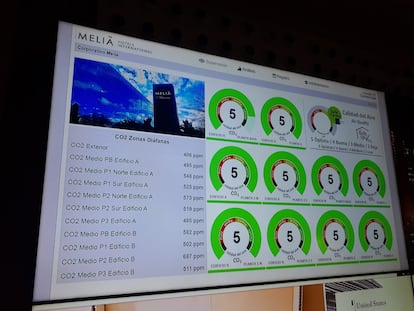Spanish companies divided over employees’ return to the workplace
Many large firms are delaying on-site activity due to the fifth wave of the pandemic, while some seem to favor a model allowing two days of remote work a week


Spain’s biggest companies had marked September 1 as the day when their employees would return in large numbers to the workplace after nearly a year and a half of remote work.
But it was not to be. The intensity of the fifth wave of the coronavirus has forced many employers to remain prudent and keep their existing protocols in place.
While some companies have decided that staff will return to their posts in early September, in many other cases employers have yet to draft their roadmap for the return to normality.
Even so, right now only 10% of Spanish employees are still working remotely compared with 25% last year, according to Carlos Gutiérrez, in charge of emerging labor trends at the CC OO union.
According to a recent study by Boston Consulting Group (BCG), 90% of companies want to introduce some form of remote work once the pandemic is over. But for now, there are very few large companies that have adopted a 100% flexible model, meaning that employees may choose where they work.
Two of these are the banking group ING and the insurance company Liberty Seguros. And the renewable energy group Siemens Gamesa is planning to go down that road as well with a program called Smart Working, which will let employees work from home five days a week from any place they like, said a company source. The office space is already undergoing renovation work to adapt it to a new system without designated desks for workers.

Not even tech companies like Google, Amazon or Telefónica, which are generally ahead of the curve in terms of work models, are planning to go that far. All three favor a mixed model of three days on-site and two days of remote work. But they are open to the possibility that a few employees could work entirely from a different location, either on a temporary or permanent basis.
Among Spain’s largest employers, the insurance group Mapfre will wait until September 15 “to see how the fifth wave of the pandemic develops and design the plan for a return to the workplace accordingly,” according to a company spokesperson. Right now half of the staff is working on-site and half remotely. Santander Bank, where less than 60% of employees are back at the workplace, said it would wait another two weeks as well before making a decision. Similar answers were given at BCG and Cellnex, a Spanish telecoms firm that is expecting to have 50% of staff back at the office by mid-September, up from 30% now.
At the consulting firm EY, José Luis Risco said that a general return might be postponed until Christmas. “We were hoping the situation would change in September, but it’s going to change very little and organizations will keep pondering which labor model to implement when normality returns.”
There will be changes at the banking group BBVA, which is already operating with a mixed model of work– 60% in-person, 40% remote. Starting on September 1, team leaders will designate the days when employees have to come into the office, where space will be booked via an application. And at Red Eléctrica, all employees will have weekly rotating shifts to ensure that 50% of workers are on site every morning.
The 3/2 model
So far, it looks like the three-days-on-site/two-days-from-home model is favored by a majority of large organizations, including EY, BCG, BMW, the insurance company Axa and the telecoms operator Vodafone.
The big remaining question, according to Pablo Claver, head of human resources at BCG, is how the new model will operate: will the three on-site days be considered a weekly maximum or a minimum? Will it be mandatory or considered more like guidance? Will it benefit employees or employers? As usual in these cases, it pays to read the small print. “If companies go for a fixed model, they can save on office space, company cars, cafeteria service and food and meal passes. If they go for a flexible model, the benefits are for the employee,” he said.
In any case, most companies have yet to adapt their collective bargaining agreements to the new remote work legislation that entered into force in Spain on July 9. “Adaptation is still in the early stages because companies are resisting negotiations and saving costs,” said Cristina Estévez, in charge of institutional policy at UGT, Spain’s other leading labor union.
The unions have also detected instances of labor violations, such as refusing to cover the costs of working from home. There are exceptions: the insurance group Mapfre has been paying employees an additional €45 a month to cover the costs of Wi-Fi internet access, electricity and other expenses derived from remote work. Siemens Gamesa is paying €55, and Axa is giving its workers €3 a day plus a one-time €200 check for special equipment such as chairs and screens. Vodafone has sent employees a remote work kit that includes an ergonomic chair, wireless headphones, a keyboard and a mouse.
Remote work in high demand
Remote work has become a basic element of the labor landscape in Spain, according to Alberto Gavilán, director of talent at the temporary staffing firm Adecco. According to him, 30% of the job offers his company handles are offering the possibility. “Many candidates are demanding it, and they are ruling out offers where the company does not consider this option,” he said. “Remote work has changed the rules of the game in terms of attracting talent.” Tech and computer companies, as well as start-ups, are planning to adopt it extensively, and remote work is also extending to insurance, call centers, professional services and back office services.
English version by Susana Urra.
Tu suscripción se está usando en otro dispositivo
¿Quieres añadir otro usuario a tu suscripción?
Si continúas leyendo en este dispositivo, no se podrá leer en el otro.
FlechaTu suscripción se está usando en otro dispositivo y solo puedes acceder a EL PAÍS desde un dispositivo a la vez.
Si quieres compartir tu cuenta, cambia tu suscripción a la modalidad Premium, así podrás añadir otro usuario. Cada uno accederá con su propia cuenta de email, lo que os permitirá personalizar vuestra experiencia en EL PAÍS.
¿Tienes una suscripción de empresa? Accede aquí para contratar más cuentas.
En el caso de no saber quién está usando tu cuenta, te recomendamos cambiar tu contraseña aquí.
Si decides continuar compartiendo tu cuenta, este mensaje se mostrará en tu dispositivo y en el de la otra persona que está usando tu cuenta de forma indefinida, afectando a tu experiencia de lectura. Puedes consultar aquí los términos y condiciones de la suscripción digital.








































